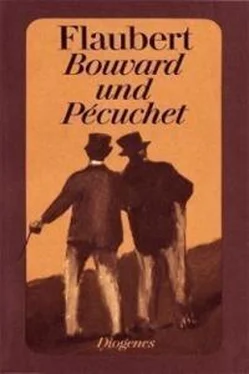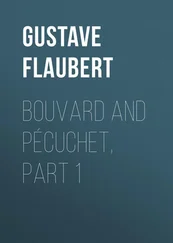"She's nice, eh?" said the joiner, while she was bringing them the glasses. "You might take her for a lady dressed up as a peasant–girl, and yet able to do rough work! Poor little heart, come! When I'm rich I'll marry you!"
"You are always talking nonsense, Monsieur Gorju," she replied, in a soft voice, with a slightly drawling accent.
A stable boy came in to get some oats out of an old chest, and let the lid fall down so awkwardly that it made splinters of wood fly upwards.
Gorju declaimed against the clumsiness of all "these country fellows," then, on his knees in front of the article of furniture, he tried to put the piece in its place. Pécuchet, while offering to assist him, traced beneath the dust faces of notable characters.
It was a chest of the Renaissance period, with a twisted fringe below, vine branches in the corner, and little columns dividing its front into five portions. In the centre might be seen Venus–Anadyomene standing on a shell, then Hercules and Omphale, Samson and Delilah, Circe and her swine, the daughters of Lot making their father drunk; and all this in a state of complete decay, the chest being worm–eaten, and even its right panel wanting.
Gorju took a candle, in order to give Pécuchet a better view of the left one, which exhibited Adam and Eve under a tree in Paradise in an affectionate attitude.
Bouvard equally admired the chest.
"If you keep it they'll give it to you cheap."
They hesitated, thinking of the necessary repairs.
Gorju might do them, cabinet–making being a branch of his trade.
"Let us go. Come on."
And he dragged Pécuchet towards the fruit–garden, where Madame Castillon, the mistress, was spreading linen.
Mélie, when she had washed her hands, took from where it lay beside the window her lace–frame, sat down in the broad daylight and worked.
The lintel of the door enclosed her like a picture–frame. The bobbins disentangled themselves under her fingers with a sound like the clicking of castanets. Her profile remained bent.
Bouvard asked her questions as to her family, the part of the country she came from, and the wages she got.
She was from Ouistreham, had no relations alive, and earned seventeen shillings a month; in short, she pleased him so much that he wished to take her into his service to assist old Germaine.
Pécuchet reappeared with the mistress of the farm–house, and, while they went on with their bargaining, Bouvard asked Gorju in a very low tone whether the girl would consent to become their servant.
"Lord, yes."
"However," said Bouvard, "I must consult my friend."
The bargain had just been concluded, the price fixed for the chest being thirty–five francs. They were to come to an understanding about the repairs.
They had scarcely got out into the yard when Bouvard spoke of his intentions with regard to Mélie.
Pécuchet stopped (in order the better to reflect), opened his snuff–box, took a pinch, and, wiping the snuff off his nose:
"Indeed, it is a good idea. Good heavens! yes! why not? Besides, you are the master."
Ten minutes afterwards, Gorju showed himself on the top of a ditch, and questioning them: "When do you want me to bring you the chest?"
"To–morrow."
"And about the other question, have you both made up your minds?"
"It's all right," replied Pécuchet.
Chapter IV.
Researches in arch æ ology.
Six months later they had become archæologists, and their house was like a museum.
In the vestibule stood an old wooden beam. The staircase was encumbered with the geological specimens, and an enormous chain was stretched on the ground all along the corridor. They had taken off its hinges the door between the two rooms in which they did not sleep, and had condemned the outer door of the second in order to convert both into a single apartment.
As soon as you crossed the threshold, you came in contact with a stone trough (a Gallo–Roman sarcophagus); the ironwork next attracted your attention. Fixed to the opposite wall, a warming–pan looked down on two andirons and a hearthplate representing a monk caressing a shepherdess. On the boards all around, you saw torches, locks, bolts, and nuts of screws. The floor was rendered invisible beneath fragments of red tiles. A table in the centre exhibited curiosities of the rarest description: the shell of a Cauchoise cap, two argil urns, medals, and a phial of opaline glass. An upholstered armchair had at its back a triangle worked with guipure. A piece of a coat of mail adorned the partition to the right, and on the other side sharp spikes sustained in a horizontal position a unique specimen of a halberd.
The second room, into which two steps led down, contained the old books which they had brought with them from Paris, and those which, on their arrival, they had found in a press. The leaves of the folding–doors had been removed hither. They called it the library.
The back of the door was entirely covered by the genealogical tree of the Croixmare family. In the panelling on the return side, a pastel of a lady in the dress of the period of Louis XV. made a companion picture to the portrait of Père Bouvard. The casing of the glass was decorated with a sombrero of black felt, and a monstrous galoche filled with leaves, the remains of a nest.
Two cocoanuts (which had belonged to Pécuchet since his younger days) flanked on the chimney–piece an earthenware cask on which a peasant sat astride. Close by, in a straw basket, was a little coin brought up by a duck.
In front of the bookcase stood a shell chest of drawers trimmed with plush. The cover of it supported a cat with a mouse in its mouth—a petrifaction from St. Allyre; a work–box, also of shell work, and on this box a decanter of brandy contained a Bon Chrétien pear.
But the finest thing was a statue of St. Peter in the embrasure of the window. His right hand, covered with a glove of apple–green colour, was pressing the key of Paradise. His chasuble, ornamented with fleurs–de–luce, was azure blue, and his tiara very yellow, pointed like a pagoda. He had flabby cheeks, big round eyes, a gaping mouth, and a crooked nose shaped like a trumpet. Above him hung a canopy made of an old carpet in which you could distinguish two Cupids in a circle of roses, and at his feet, like a pillar, rose a butter–pot bearing these words in white letters on a chocolate ground: "Executed in the presence of H.R.H. the Duke of Angoulême at Noron, 3rd of October, 1847."
Pécuchet, from his bed, saw all these things in a row, and sometimes he went as far as Bouvard's room to lengthen the perspective.
One spot remained empty, exactly opposite to the coat of arms, that intended for the Renaissance chest. It was not finished; Gorju was still working at it, jointing the panels in the bakehouse, squaring them or undoing them.
At eleven o'clock he took his breakfast, chatted after that with Mélie, and often did not make his appearance again for the rest of the day.
In order to have pieces of furniture in good style, Bouvard and Pécuchet went scouring the country. What they brought back was not suitable; but they had come across a heap of curious things. Their first passion was a taste for articles of virtù ; then came the love of the Middle Ages.
To begin with, they visited cathedrals; and the lofty naves mirroring themselves in the holy–water fonts, the glass ornaments dazzling as hangings of precious stones, the tombs in the recesses of the chapels, the uncertain light of crypts—everything, even to the coolness of the walls, thrilled them with a shudder of joy, a religious emotion.
They were soon able to distinguish the epochs, and, disdainful of sacristans, they would say: "Ha! a Romanesque apsis!" "That's of the twelfth century!" "Here we are falling back again into the flamboyant!"
Читать дальше








![Гюстав Флобер - Закат Карфагена [Сборник]](/books/414440/gyustav-flober-zakat-karfagena-sbornik-thumb.webp)


